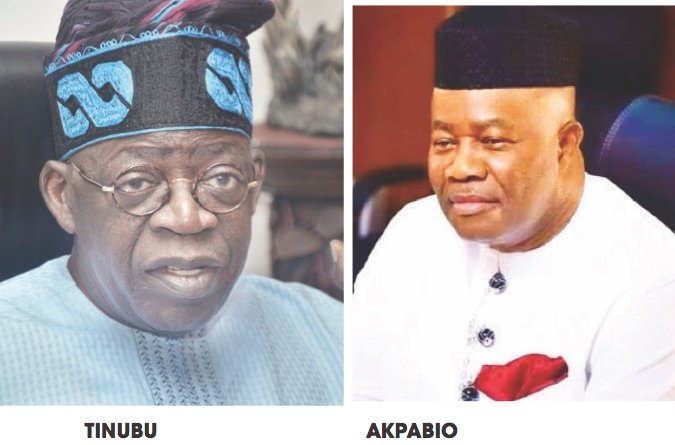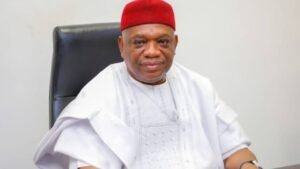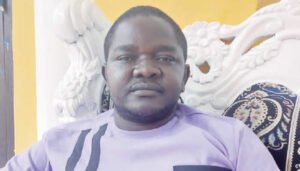• Govs mount pressure, NEC to consider states’ request in January ν How we intend to curtail govs’ excesses – Lawmakers
From Ismail Omipidan and Ndubuisi Orji, Abuja
Barring any last-minute change, Nigeria is expected to soon join the league of countries with a decentralised policing system, otherwise known as state police, going by feelers around the country.
Saturday Sun gathered that all the 36 governors of the country, most of whom kicked against it about six years ago, have today endorsed the move. Saturday Sun investigations further revealed that the governors are backing the establishment of the outfit so as to give them “more control” over security decisions in their various states.
In their estimation, they believed that the locals within the various communities are better placed to fight armed banditry and other associated crimes, largely because they understand the terrain and language.

At the end of the last National Economic Council (NEC) meeting, chaired by Vice President Kashim Shettima, Kaduna State Governor, Senator Uba Sani, while briefing State House Correspondents on the outcome of the NEC meeting, said: “Today, one of the discussions we had at the NEC meeting was the update on the creation of state police. As you are aware, there was a submission by states toward the establishment of state police.
“Thirty-six states have all submitted their own position on state police. From what is available, virtually most of the states are in agreement with the establishment of state police in Nigeria. I want to say here clearly that most of us are in agreement with the establishment of state police.”
He added: “The establishment of state police in Nigeria is the way forward toward addressing the problem of insecurity.”
Although, the NEC has however deferred final discussions on the report till January, 2025, when the detailed report is expected to be presented for exhaustive deliberation, it is not clear if the Nigerian Police would be kicking against this latest move the same way it has always done in the past.
Previous attempts at pushing state police through
The awkward nature of Nigeria’s brand of federalism has always been a subject of debate. But while some members of the Nigerian elite and politicians pontificate over it out of government, analysts believe that they begin to prevaricate over it once in government.
However, there are a few who have never left anyone in doubt as to where they stand on fiscal federalism, just as their views on state police, is unmistaken. President Bola Ahmed Tinubu has for long been an advocate of state police. And for now, nothing to indicate that he has shifted position.
Saturday Sun recalled that in early 2018, at a security summit organised by the Senate, the Federal Government threw its weight behind the agitation for the establishment of state police, saying it was clearly the way to go in the face of multifaceted security challenges confronting the country.
The then Vice President Yemi Osinbajo, gave the hint at the summit, held in Abuja.
He said the nature of the country’s security challenges were complex and known.
“Securing Nigeria’s over 900,000sq km and its 180 million people requires far more men and materials than we have at the moment. It also requires a continuous reengineering of our security architecture and strategy. This has to be a dynamic process.
“For a country of our size to meet the one policeman to 400 persons prescribed by the United Nations would require triple our current police force; far more funding of the police force and far more funding of our military and other security agencies. We cannot realistically police a country the size of Nigeria centrally from Abuja. State police and other community policing methods are clearly the way to go.”
Following the above position, the then Senate which initially kicked against the idea, made a U-turn from its original stance, and decided to key into the new thinking of the government by introducing a Bill, five months later, to begin the process of amending the 1999 Constitution, so as to give legal backing to the establishment of state police.
Expectedly, the Bill, titled “Constitution of the Federal Republic of Nigeria (Alteration) Bill, 2018 (SB. 694),” was presented by Senator Ike Ekweremadu. It was sponsored by him and 70 other senators. Ekweremadu at the time was the Deputy Senate President and chairman of the Committee on the Review of the 1999 Constitution.
The Bill was read for the first time on Thursday, July 12, 2018. After the first reading, nothing more was heard of the bill, just as those who were initially clamouring for the establishment of state police lost their voices.
But later, all the governors, under the auspices of the Nigeria Governors Forum (NGF) agreed to the proposition and were unanimous in their resolve to push for it.
But by the time they met with the then President Muhammadu Buhari to present their position, one or two of the governors, who had initially supported the move began singing a different tune.
This much was confirmed by the immediate past NGF chairman and former Ekiti State Governor, Dr. Kayode Fayemi during one of his encounters with journalists shortly after the NGF’s meeting. He explained that the matter should be approached with caution because it broke their ranks in the past.
However, as a security expert, the former governor believed very strongly that the establishment of state and community policing system was the surest way to confront headlong, the country’s recurring security challenges.
“Everybody agrees that the system has broken down so why are we pretending even when you call the police and ask them privately, they agree with you. So my position remains the same on state police. I will continue to fight for it.
“We have argued on our part that you are much more efficient in an area you are familiar with. If you bring a policeman from Zungeru to Ekiti State, it will take him a considerable amount of time before he becomes familiar with that environment, before he knows the nuances. Police work is not all about the gun you carry about; it is about the intelligence and that is what has been lacking. It is the absence of intelligence that has hampered police from operating efficiently,” fayemi said.
The new Push
The House of Representatives had on February 20, passed a bill for the establishment of state police for second reading. The bill, which is sponsored by the Deputy Speaker, Benjamin Kalu, and 14 others, was subsequently referred to the Constitution Review Committee.
However, that would not be first time the House would be making moves to amend the Constitution to make room for state police. Saturday Sun recalled that the Green chamber had in the Ninth assembly passed a bill for the removal of policing from the exclusive legislative list and moved it to the concurrent list, so as to enable states to establish their own police. The bill was however rejected by the parliament during the last alteration of the 1999 Constitution (as amended), in 2022.
Saturday Sun findings show that often, the fear of the proposed outfit being abused by the governors is the major push back each time the advocates of state police moot the idea.
Lawmakers list measures to curtail excesses
But the House of Representatives has said it would put in place framework to guard against abuse of the state police, if established.
The deputy chairman, House Committee on Media and Public Affairs, Philip Agbese told one of our correspondents that the parliament would ensure that there is legal framework that will make for checks and balances in the operation of state police, if established.
Agbese, who is also the spokesman for the House Special Committee on Constitution Review, disclosed that the committee has received several memoranda from stakeholders seeking the establishment of state police.
“As I speak to you, the parliament is working assiduously with stakeholders, experts and professionals to see how we can birth a new Constitution.
“And many Nigerians have expressed their opinion very strongly in support of state police. But as a committee, we have not taken any decision as far as that is concerned. What we are doing as a committee is to ensure that there is level playing to ensure that all stakeholders express themselves. And in line with our mantra that the parliament is the people’s parliament, we want the voice of the people to be heard. That is exactly what is going to guide the resolution in considering amendments to the constitution.
“So, we believe that abuses by state governors will not be there, because the template will be such that there would be checks and balances. It is not going to be something that will totally be in the hands of the state governors and it is not going to be something that we used to have,” Agbese added.
Also speaking on the matter, member, representing Enugu East/ Isi-uzo Federal Constituency of Enugu State, Professor Paul Nnamchi, noted that the push for state police is a good one.
However, Nnamchi, who is also a member of the Labour Party (LP), said there are fears that the operation of state police, if established, could be politicised by state governments.
“It is good. I have lived in several parts of Europe and America; they have their local police. They also have their national police. But whether Nigeria is mature for that or not remains the question.
“The greatest fear of a lot of people is the abuse. When I was growing up, during the NPN, NPP era, Anambra State had APF, which was the Anambra Police Force and NPF, was being used by the party at the centre in the state for their own needs.
“And the APF, which later turned to Jim Vanguard was been used by the state. Sometimes you have fracas. Sometimes you have issues that they were more interested in politics than the security of the people.
“By implication, you have a Herculean task curtailing violence during that period. You don’t know who is actually perpetrating it. And our population was not large then, in 1983, when those things were happening.
“If the maintenance of the police in the state comes from first line charge, then the police will be a bit independent, knowing that they can outlive each governor, because it is now a civil service affair, that it is serving the people not a person, because the institution is greater than one person, ” the lawmaker added.
The initial state police bill that was killed
One unique feature about the bill proposed by the former Deputy Senate President, Ike Ekweremadu, but which was killed is the fact that it addresses the critical issues of structure, standardisation, control, armament, disciplining, co-existence with federal police, and, significantly, the fears of abuse by state governors. He drew experiences from best practices around the world, especially the US, Canada, and Brazil to make his propositions.
He also submitted that since state police will not be compulsory, those who cannot afford it immediately owing largely to lack of funds, will continue to rely on the federal police until such a time that they are able to have enough funds to cater for it – just as the establishment of state universities.
The bill proposes the establishment of the Federal Police, State Police, National Police Service Commission, National Police Council, and State Police Service Commissions. The Federal Police shall be responsible for the maintenance of public security, preservation of public order and security of persons and property throughout the federation to the extent provided for under the constitution or by an Act of the National Assembly, while the State Police, shall be organised and administered in accordance with such provisions as may be prescribed by a Law of the House of Assembly of a State subject to the framework and guidelines established by an Act of the National Assembly. Under the proposed law, a Commissioner of State Police shall be appointed by the governor of the state on the advice of the National Police Service Commission, subject to confirmation of such appointment by the House of Assembly of the state. The Commissioner shall be in office for a period of five years only or until he/she attains a retirement age prescribed by law, whichever is earlier. So, the governor is not the sole appointing authority.
The proposed law also recognises the fact that the governor may give lawful directives to the CP with respect to the maintenance and securing of public safety and public order as he may consider necessary, but the commissioner of police shall only comply to the extent that those directives or order are neither unlawful nor contrary to general policing standards or practice. If the commissioner finds them so, he may request that the matter be referred to the State Police Service Commission for review and the decision of the state Commission shall be final and shall not be inquired into by any court.
The bill also provides enough security of office for Commissioners of State Police. For instance, a commissioner shall only be removed by the governor upon the recommendation of the National Police Service Commission on the grounds of misconduct in the performance of his official duties; serious breach of policing standards; conviction of any offence by a court of law or tribunal (including administrative tribunals set up by the police authorities for internal disciplining of police officers); indictment by a judicial body or tribunal for corruption, fraud, embezzlement or other unacceptable conducts in office; bankruptcy; mental incapacity; and participation in political activities of any kind either within or outside the state and including sponsoring or giving aid to any political group of movement. But importantly, such removal shall be subject to approval by two-thirds majority of the State Assembly.
Furthermore, an Act of the National Assembly may prescribe a periodic review of the activities of each State Police Service by the National Police Service Commission after which it may be recertified as long as its operations adhere to set standards and regulations and do not undermine national integrity, promote ethnic, tribal or sectional agenda or marginalise any segment of the society.
Interestingly, membership of the State Police Service Commission is to be drawn from a wide range of critical stakeholders, thus making it difficult for anyone to pocket the Commission. Chairman is to be appointed by the governor subject to the confirmation of the State House of Assembly; a representative of the Federal Government to be appointed by the National Police Service Commission, two members, who must be indigenes of the respective state to be appointed by the National Human Rights Commission; a representative of the Public Complaints Commission; a representative of the Labour to be appointed by the Chairman of the state branch; three retired police officers from three senatorial districts to be appointed by the governor subject to confirmation of the State House of Assembly; a lawyer-representative of the Nigerian Bar Association and a representative of the Nigerian Union of Journalists to be appointed by their respective council chairmen. In the past, lawmakers were the ones who killed the idea of a state police. In fact, one of them, Senator Ita Enang, confessed on a National TV programme mid this year that “Senator Ike Ekweremadu was very vehement that we should have state police. He sponsored and brought a bill.
I was one of those who vehemently opposed him and campaigned against it. I went out of my way to say that the way the governors exercise power over the electoral process, if you give them the control over security, they would kill everybody. But now, it is no more the question of the governors. We now should not care so much about what a governor does with it so long as he does one thing with it – use it to manage internal security of the state. State police is an idea which time has come.”
Will they do the same this time around? It seems only time will tell.







